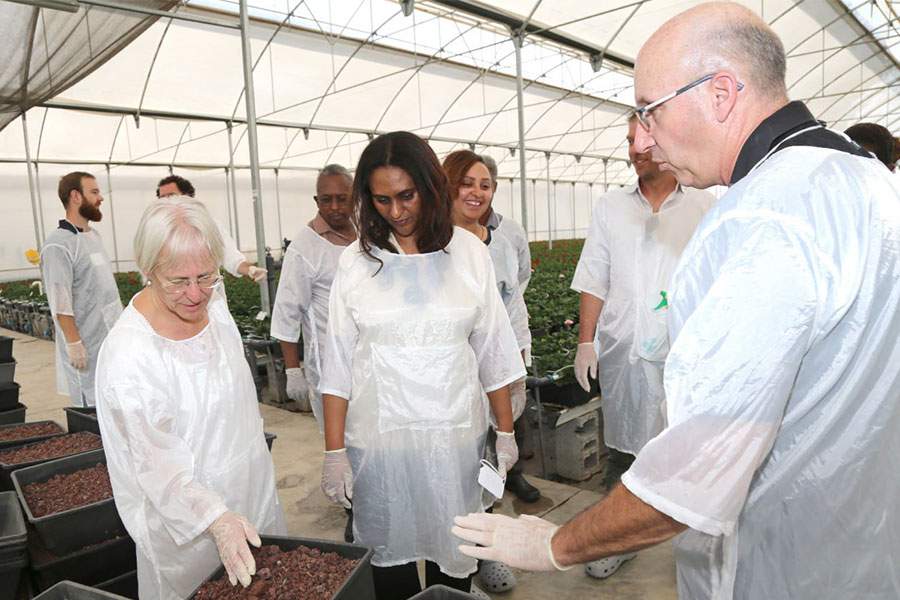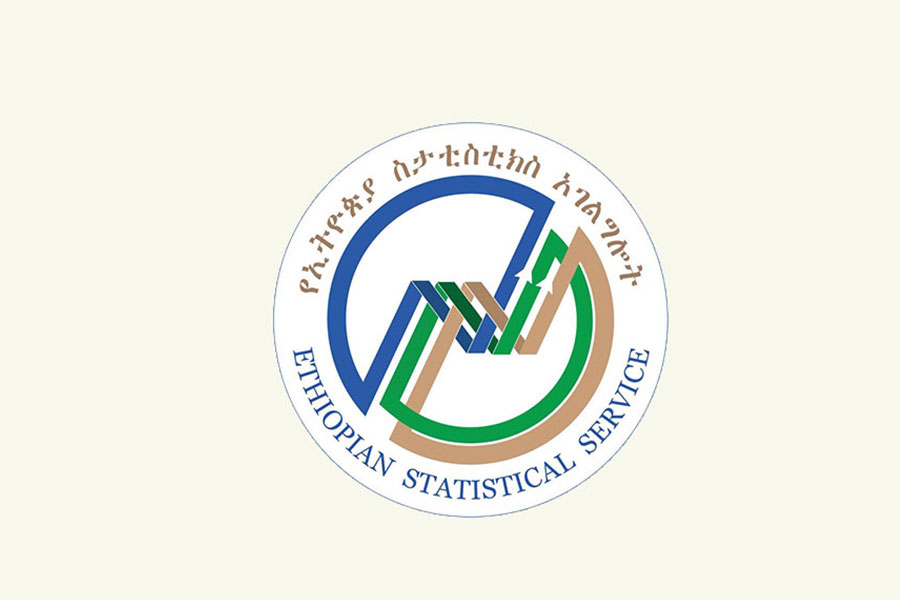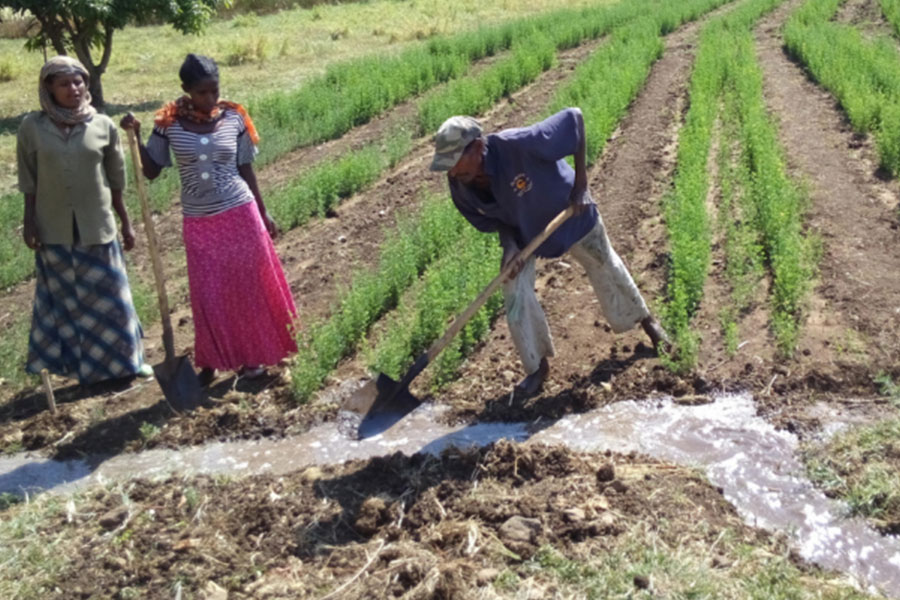
Radar | May 24,2025
Assela town, 126Km south of Addis Abeba in the Oromia Regional State, may have a reputation for nurturing world track-star athletes.
It is also a prominent barley producer region, with the quality highly sought by the brewery industry. Of the one million hectares of barley harvested, 20pc is used for malt production; the vast plain land in the Assela area generates much of this.
"It's such a blessed land," said Jean-Benoit VIVIT, head of Soufflet, a french company that opened a malt factory in Ethiopia in 2017.
Vivit is proud of the wonders seeds supplied by his company have done and looks forward to a more enriching partnership with brewers and competing companies in the malt processing industry.
Gonder and Assela malt factories are working with GIZ, the German development agency, to substitute the barley used to produce malt with the domestic market. Boort Malt has been sourcing all its demands, valued at 800 million Br, from local farmers for the last three years.
The Assela Malt Factory is the leading malt supplier, established 40 years ago. Close to 2.2 million quintals of barley are processed annually, giving hope that domestic brewers will stop importing malt barely in the coming year. Farmers around Assela began to cover 90pc of the source last year, a result of cumulative effort exerted by the beverage industry.
The Gonder Malt Factory processes an annual 230,000Qtl of barley. According to the Chief Executive Officer (CEO), Tadesse Kassahun, over 90pc of the barley processed by his factory is sourced from farmers in the Oromia and Amhara regional states. It was on the verge of halting production eight years ago due to supply shortages if it was not for imports.
Ethiopia imported barley from Belgium and France two years ago for 2.45 million dollars annually. The skyrocketing import bills since have put a strain on breweries with low malt barley production. Studies projected the import bill for malt will balloon to 420 million by 2025.
Traditional methods of farming and seeds yielding low harvest used in previous years led to insufficient production that put farmers in a dilemma between keeping the harvest for consumption and sourcing it for the factories. The supply from local farmers was up to half a million quintals.
Zewdie Bishaw and Adamu Mulla researched barely farming and published a book for ICARDA, an international organisation. They believe farmers can meet growing domestic demand and reduce imports with a favourable environment and improved technologies. According to the researchers, farmers can grow malt barley cost-effectively and improve their livelihoods through increased income.
Heineken and Dashen breweries, in partnership with Gonder Malt Factory, have been working on a project to raise harvest with 35,000 farmers in Amhara Regional State. GIZ financially supported the project with a grant of nearly one million euros.
Heineken has also partnered with the Oromia Agricultural Transformation Institute and GIZ since 2013, providing 7.5 million dollars in financial support for farmers in the outskirts of Assela. The project is designed to benefit 70,000 farmers who could fully cover the demand from the beer industry.
Sisay Mekasha is one of these farmers recognised as a role model for other farmers in his village. He used to produce 10Qnt to 20Qnt of barley on a hectare of land and supply the Asella Malt Factory with 500 Br for a quintal. Although he has 12hct of land, sending children to school and sustaining the family was a struggle.
However, his harvest was increased three-fold after substituting seeds, on sale for 4,000 Br. His income ballooned, selling his barley for 5,000 Br.
"We've been introduced to varieties of barley crops," Sisay told Fortune. "Barley has become our coffee and gold."
The French company, SUOFFLET, supplied these seeds dubbed "Traveller", "Fatima", and "Grace" to these local farmers with help from the European Cooperative for Rural Development (EUCORD).
EUCORD, through its BOOST project, works on improving farmers' barley production by increasing access to improved seed varieties.
The Traveller seed goes well with the soil in the area, with farmers preferring it better.
The Institute helped the project by providing land for production, locating the farmers, and cooperating with studies and research. It is working to improve production further through training and introducing effective products. The Head of the Institute, Abebe Deriba, is pleased to see improvement in farmers' life. He described the partnership between Heineken, Soufflet and EUCORD as a game-changer.
Mega Haji has been on the Heineken project for over eight years. He sends his children to private schools; he attributes the changes in his living standard to the Traveller seed.
The malt barley projects have earned a reputation by securing local sourcing of raw materials for food and beverage industries, engaging large numbers of smallholder farmers. Heineken Ethiopia has been awarded for these activities.
"Soufflet and ATI have played a major role in this global award," said Antenh Mitiku, director of supply chains at the Heineken Breweries.
Heineken has been working in the Oromia region to boost barley production since 2013, which helped substitute 90pc of imports of malt barley.
PUBLISHED ON
Nov 27,2022 [ VOL
23 , NO
1179]

Radar | May 24,2025

Fortune News | Mar 09,2019

Radar | May 31,2020

Radar | Jun 21,2025

Fortune News | Apr 09,2022

Verbatim | Mar 19,2022

Radar | Feb 20,2021

Sunday with Eden | Dec 31,2022

Fortune News | Apr 04,2020

Editorial | Oct 21,2023

Dec 22 , 2024 . By TIZITA SHEWAFERAW
Charged with transforming colossal state-owned enterprises into modern and competitiv...

Aug 18 , 2024 . By AKSAH ITALO
Although predictable Yonas Zerihun's job in the ride-hailing service is not immune to...

Jul 28 , 2024 . By TIZITA SHEWAFERAW
Unhabitual, perhaps too many, Samuel Gebreyohannes, 38, used to occasionally enjoy a couple of beers at breakfast. However, he recently swit...

Jul 13 , 2024 . By AKSAH ITALO
Investors who rely on tractors, trucks, and field vehicles for commuting, transporting commodities, and f...

Jul 5 , 2025
Six years ago, Ethiopia was the darling of international liberal commentators. A year...

Jun 28 , 2025
Meseret Damtie, the assertive auditor general, has never been shy about naming names...

Jun 21 , 2025
A well-worn adage says, “Budget is not destiny, but it is direction.” Examining t...

Jun 14 , 2025
Yet again, the Horn of Africa is bracing for trouble. A region already frayed by wars...